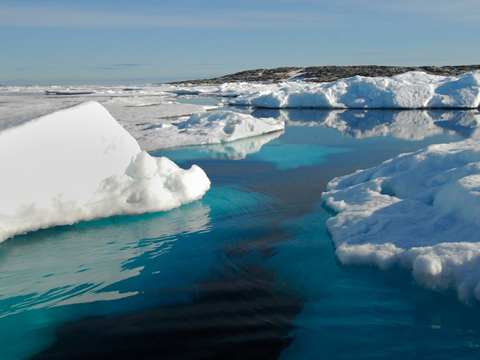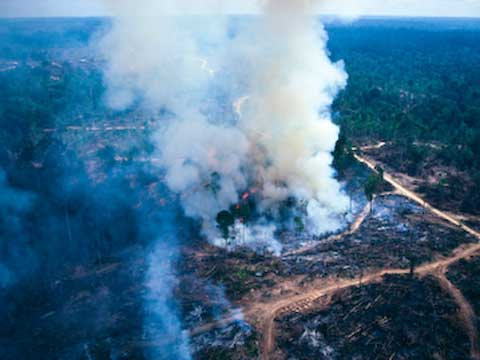Russian activist Evgenia Chirikova leads the Save Khimki Forest campaign and is one of six 2012 Goldman Prize winners
You've gone from being a working mum of two, to one of the country's foremost environmental activists and enemy of the Putin regime, how did it all come about?
It came about gradually. I wasn't simply a working mum; I was also an engineer who had my own business. Because I ran my own business I knew a lot about paying taxes. I was very surprised when I learned that the construction of the Moscow-St. Petersburg highway would cut through swathes of Khimki forestland [2500 acres of federally protected forest in northern Moscow]. Naturally I was curious so I wrote to various government organisations and was shocked by the letters I received in reply. They didn't contain any reasonable information. To paraphrase, both letters said that because Putin designed the project it is therefore legal.
The more we objected to the project, the more we learned how the project was not only ridiculous, but also corrupt. We managed to learn that, with regards to the French construction company managing the project, Vinci, it wasn't there to transfer new technology but for the purposes of transferring taxpayers' money into offshore accounts, essentially [say anti-corruption campaigners] to one of Mr. Putin's best friends, Russian oligarch Mr Arkadi Rotenberg.
The people who object to Putin's system of sending money offshore are risking their safety and their lives. The journalist Mikhail Beketov, who published articles exposing corruption in the Khimki forest project, was then assaulted and beaten up so badly that he can no longer walk or talk and lost three fingers and a leg. Another example is Sergei Magnitsky, [who uncovered the largest tax fraud in Russia's history committed by government officials] was arrested and tortured to death in custody. There are a variety of other examples where people are trying to fight this project or this system and are brutally assaulted as a result.
Are you scared for your own safety?
I am very close friends with Mikhail [Beketov] and when I saw him after the attack when he came out of the intensive care unit, I was so scared I thought I should leave Russia. With a group of environmental experts and NGOs, we conducted a review of the country's environmental issues, which included eleven alternate routes for the road planned to go through the Khimki forest. Several days after passing this expert environmental review to President Medvedev, Social Services showed up at my house with an anonymous report about me, saying I neglect my children, that I beat them and I don't feed them. That was very scary because it meant that I could lose my children and be in prison for assault. But I fought hard against it. I decided to publicly announce that this had happened and people came to support me, it became a big scandal. As a result of that I am safe. But basically even though I pay my taxes and I pay for police services, I cannot seek their help. The police wouldn't help me.
Is there a green vote in Russia? Should environmentalists put their efforts in creating a Green party or would it be more effective for people to be protesting on the street?
Firstly I would like to say that we had Green party before, which was actually not a real Green party because it was created by the Kremlin. At the moment we don't have a Green party. To be honest, Russian people need support and help in protecting their environment. United Russia, or Putin's party, and Putin's regime, is centred on exploiting and making money from natural resources. This highway project between Moscow and St Petersburg is one example. But there are so many others. This is why my friends and I have organised a movement called 'Our Land' or 'Nasha Niva' and we are travelling around the country to help other people to unite and organise similar movements as ours in the Khimki Forest.
We are helping organise camps to protect forests; helping activists in the Voronezh region protect a conservation area from planned nickel production; and supporting activist Suren Ghazaryan, who is facing five years of imprisonment for campaigning for environmental protection for the 2014 Sochi Winter Olympics [much of the building is between UNESCO-protected Caucasus Biosphere Reserve and the Sochi National Park].
At the moment this is the most accepted form of supporting citizens. If it appears that a political party will be the most accepted way, we will register as a political party. At the moment we are just a citizen society.
You blame ‘Putinomics' for the country's environmental ills but doesn't this lack of environmental protection extend to well before Putin came to power?
‘Putinomics' refers to natural resources economics, but Russia has great intellectual resources and production resources, so we don't really need to use our natural resources in order to survive. But you're absolutely right to say that this was designed prior to Mr Putin, in fact the system was designed by Mr Yeltsin and Putin is his follower who continues to implement it. I don't see Mr Putin as the only evil-faced person because it could be another person coming to power and using the same system of natural resource economics. What we actually need to do is to change this system, not the person and we need to think of other means of survival. We need to use our intellect, our brains, not just our natural resources.
Is environmental awareness growing in Russia? Are Russians becoming more aware of climate change?
The Russian public's environmental consciousness is represented mainly at a local level. People will do things like stand in front of bulldozers when their forests are under threat. They physically try to protect their land, rivers and forests. Where climate change is concerned, I would say that unfortunately in Russia there is widespread propaganda supported by Mr Putin and the media to say that stories about global warming are untrue and that people shouldn't be concerned about it at all. Environmental protection in Russia is not really on a national scale, as much as it is on a local scale.
Despite this, you have managed to bring the issue of the Khimki forest to national, and now international, attention. How can you explain this? What techniques do you use as a campaigner?
First I would to say that we use peaceful, non-violent methods, we adhere to Gandhi's methods in India. We teach local people that environmental protest should not be violent at all. Violence promotes counter violence and there's a lot of violence in Russia already and we do not want to escalate that. Secondly, we design our work in functional principles. What I mean is that one person cannot possibly always go to the media and do legal work as well, so we try to allocate various tasks to various people. That is very important to create a system for our movement to function. Because I went to business school myself, I learned how to run a business. Our movement works on the same principles as a small business. When doing community work, we try to control and we try to plan our actions as much as we can, although as you know in Russia, everything changes so quickly that it can be very difficult to plan actions. Our approach is very systematic and constant. We try to go in every possible direction to influence and put pressure on government officials, the courts, the media, even though the media sometimes doesn't want to publish information about such sensitive and big issues.
Are there many environmental NGO's in Russia? How strong is the membership or support of environmental NGOs?
It would be a bit difficult for me to answer this question because we are not an NGO ourselves. I think that registering as an NGO in Russia can be harmful because the government will then try to obstruct our activities in every possible legal way. I personally judge activities not by the status of the group, but by the activity and what they have done. Many movements in Russia, including our movement and the campaign in Chelyabinsk to protect a pine forest; the campaign to protect the Black Sea coastline from the Olympic games and beyond- all those movements are not registered NGO's. I don't have a lot of knowledge about the existence of NGO's in Russia and how many there are.
What are the big environmental issues in Russia today?
I think the main environmental problem in Russia today is the attitude of the government towards natural resources and nature. This goes beyond Moscow, St Petersburg and the surrounding areas. The ‘assault' on rivers has been especially brutal. We know that 80 per cent of river shores are now being developed, to the detriment of natural biodiversity and the environment. Lake Baikal [on UNESCO's World Natural Heritage list] which accounts for 20 per cent of the world's freshwater supplies, has been a very major problem. A survey conducted by Greenpeace Russia found that a nearby pulp and paper mill is releasing a lot of dioxins and pollution into the waters, basically destroying the water and the nature in that area. This has a very negative effect on Russia's natural treasures and it's to do with politics of course. I just feel that if the current system continues in about 10 years or so our children will have to live in a monstrous environment.
Since Putin came to power, he has been always trying to simplify the law to make it easier to destroy the forest. For example, he completely destroyed the protection of forest institutions that were created back in Soviet times. As a result of that we had a horrific forest fires in 2010. Recently he implemented the zero per cent tax on oil extracted from the Arctic region, and that also is very unfair to our environment we think. President Mr Medvedev is trying to push forward a bill simplifying planning and development in forest areas to launch infrastructure projects.
Putin's re-election took place amidst massive protests. Will Putin have to be more sympathetic to environmental issues and other civil society concerns when he takes office again next month?
Firstly I would like to say that Mr Putin was not in fact re-elected. I myself witnessed a lot of false activity during the elections as a monitor. I am sure that nobody in any European or any civilised country around the world has seen so many false acts being done during an election. At least 20 per cent of the votes were fake in Putin's election. That only proves that he doesn't have as much support as one would think he does. The second thing that I would like to say is that Putin came from the KGB, which teaches people not to compromise and not to go for any dialogue because it would be expressing your weaknesses. What he will be doing is applying pressure on people who don't support him as for example Suren Ghazaryan who fights for protecting the North Caucasus and is actually facing five years imprisonment now.
We need some sort of way to apply pressure back on Putin. In order to apply pressure back on Putin we need some sort of leverage and I think that we've got that leverage in the Magnitsky Act that allows the freezing of Russian's foreign bank accounts and a ban on Russians who commit fraud and human rights abuses going abroad. This is the biggest punishment that they could possibly face, and they are very scared of that. These people want to rob Russia of the resources and use the money elsewhere to live and buy expensive properties and so on. I think by applying this Magnitsky Act, this could be the best leverage we could possibly have. That's why we want to encourage the Western governments to look into that law and try to implement it as much as they can because that will assist us in our fight and help us protect our country and our land.
Evgenia Chirikova is one of six winners of this year's Goldman Prize, which honours grassroots environmentalists
| READ MORE... | |
 |
NEWS ANALYSIS Arctic special Putin’s Russia will lead a ‘new era of Arctic industrialisation’ The isolation of the white wilderness is coming to an end. Scientists and activists are urging caution but Russia is leading an urgent rush to exploit the Arctic’s oil and gas reserves. Tom Levitt reports |
 |
NEWS Russia's ambitions for oil off Sakhalin Island could wipe out whale species The Western North Pacific gray whale is under threat of extinction, say WWF, as Russia plans a third oil platform off Sakhalin Island |
 |
HOW TO MAKE A DIFFERENCE Tackling illegal logging Reporting from the front-line of environmental activism, Andrew Wasley takes a closer look at those combating illegal logging |
 |
HOW TO MAKE A DIFFERENCE Ecocide: making environmental destruction a criminal offence Lawyer Polly Higgins is spearheading a campaign to have 'ecocide' recognised by the UN as an international crime against peace. But how will this work in practice? |
 |
INVESTIGATION The Wild Wild East: Russia's Zapovedniks Russia’s zapovedniks are some of the world’s most pristine wildernesses. For 70 years they were protected ruthlessly by the Soviet system, but recently they have fallen prey to Putin, the World Bank and ecotourists. Paul Webster reports on their plight |








